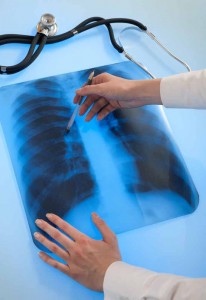-
 Cancer
CancerMayo Clinic Finds Switch That Lets Early Lung Cancer Grow Unchecked
Note: Funding information at the end of the news release has been updated.
JACKSONVILLE, Fla. — July 10, 2012. Cellular change thought to happen only in late-stage cancers to help tumors spread also occurs in early-stage lung cancer as a way to bypass growth controls, say researchers at Mayo Clinic in Florida. The finding, reported in the July 11 issue of Science Translational Medicine, represents a new understanding of the extent of transformation that lung cancer — and likely many other tumor types — undergo early in disease development, the scientists say. They add that the discovery also points to a potential strategy to halt this process, known as epithelial-mesenchymal transition, or EMT.

"Our study points to EMT as a key step in lung cancer progression during the earliest stages of cancer development," says lead investigator and cancer biologist Derek Radisky, Ph.D.
"Normal cells recognize when they are dividing too rapidly, and turn on programs that block inappropriate cell division. Here we found that early-stage lung cancer cells switch on EMT in order to bypass these controls," he says.
The discovery could offer a new way to prevent progression to late-stage lung cancer, possibly by inhibiting a particular molecule from functioning, Dr. Radisky says.
Because EMT is a well-recognized late-stage transition that occurs in all sorts of solid tumors, the researchers say they believe that the same early-stage use of EMT they found in lung cancer is likely occurring in other cancers.
EMT is a biological process used in embryonic development to allow body development, which requires the ability of cells and tissues to morph from one type to another, and develop in an orchestrated fashion.
Late-stage cancer uses EMT to change tumor cells into a form that can migrate through blood.
"The gaps in our knowledge of lung cancer have not allowed us to develop more effective targeted therapies," Dr. Radisky says. "This study offers us great new clues for a new approach to treating lung and possibly other cancers as early as possible."
Co-authors include researchers from Mayo Clinic in Rochester, Minn.; University Hospital Giessen and Marburg in Germany; Ontario Cancer Institute in Toronto; and the University of Colorado in Denver.
The study was funded by grants from the National Cancer Institute and the State of Florida's James & Esther King Biomedical Research Program.
About Mayo Clinic Cancer Center
As a leading institution funded by the National Cancer Institute, Mayo Clinic Cancer Center conducts basic, clinical and population science research, translating discoveries into improved methods for prevention, diagnosis, prognosis and therapy. For information on cancer clinical trials call 507-538-7623.
###
About Mayo Clinic:
Recognizing 150 years of serving humanity in 2014, Mayo Clinic is a nonprofit worldwide leader in medical care, research and education for people from all walks of life. For more information, visit 150years.mayoclinic.org, www.mayoclinic.org and newsnetwork.mayoclinic.org.
Media Contact: Paul Scotti, 904-953-2299 (days), scotti.paul@mayo.edu







